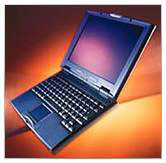"First - and this is the worst one for pure Mac fans - port
OS X to PCs. Whether it's a rumor or not, Apple was supposedly
close to finishing this task, and it got shut down.
"If we could get PC users to use an OS other than Windows, with the
aforementioned features, they would buy the iPod and switch. This
exodus would lead software manufacturers to build more OS X native
software - and faster than they do now."
This is a quote from a recent article by
Jason Laffin. There are a couple problems with this logic.
First, Apple is the only company in the computer industry that
controls both the software and hardware aspects of the business. This
allows for very good product integration between their hardware
concepts and their software programs. Everything works seamlessly (for
the most part). This is what makes the Mac relatively crash-proof.
Start porting OS X to another platform with a vastly different
hardware architecture and bad things will happen. The vaunted ease of
use and stability would be ruined, and not even Apple's code geniuses
could repair the damage.
The scope of hardware variants for the vast range of "Wintel"
platforms is astounding, and it is much harder to write the software
that would work well on the major hardware variants, much less every
single one. With the Mac platform, Apple controls the hardware design,
making sure they are compatible with the OS. If the ease of use and
stability is damaged by the port to PCs, that could turn off PC users
from the Mac forever. "Well, we tried Mac OS X, and it wouldn't
run Access. And it crashed all the time. And our SoundBlaster Live 64
card wouldn't work." Now you have a lifetime Windows user.
Second, given the choice, a lot of users on a budget (like me) would
use PC hardware rather than Apple's hardware,  cutting into Apple's profitability and exposure. When I
carry my PowerBook 2400 to
school, Apple is getting exposure. If I carry a Dell Inspiron 4100
running Mac OS X, it will give exposure to Dell, not Apple.
Hardware counts.
cutting into Apple's profitability and exposure. When I
carry my PowerBook 2400 to
school, Apple is getting exposure. If I carry a Dell Inspiron 4100
running Mac OS X, it will give exposure to Dell, not Apple.
Hardware counts.
Especially considering you can build your own PC cheap, it becomes
even worse for Apple. I have done some research on a home-built PC.
Basically, I can get a 1200 MHz Athlon with DDR RAM, DVD-ROM, and a 20
GB hard drive, as well as a SoundBlaster 64 card and a GeForce 2 AGP for
about US$1,200. For the same price, what could I get to replace my
9600? A G4/400 with a
DVD-ROM drive, a 10 GB hard drive, PC100 RAM, crappy sound, and wimpy
Rage 128. The Athlon pretty much spanks the G4 from Vermont to
Cupertino. Even if hardware/software integration was better with the
G4, if I could run Mac OS on a PC, I would do it and never buy Apple
hardware again.
Third, Apple would risk losing a lot of power users and pro-sumers.
Most of the dedicated graphics and audio people would stick with the
platform, but those who want to build their own system and configure it
exactly how they want would be getting the best of both worlds - Mac OS
on cheap, easy to get, customizable PC hardware.
This would be the death of Apple. Since there would be no pro-sumers
and power users to introduce newbies to the hardware platform, Apple
would cease to be a hardware business and become like Microsoft - but
with a 5% market share. Maybe porting the OS to PC would increase
market share to 15%, but it's a long shot.
Conclusion
At this point, Apple is selling computers on style. This isn't
entirely true, but essentially that is what is happening for consumers.
The style evident in Mac OS X isn't enough to attract these users
to buy the OS alone - it's the hardware/software package and
integration which attracts them.
Pro-sumers and power users are attracted by Apple's easy-to-use
hardware, superior OS, and hardware-software integration. Artistic
users are attracted to the ease of use, speed in artistic applications,
and integration. If OS X is ported, the hardware division will be
cut to the ground - no market for consumer products, and maybe a power
laptop and a power desktop left. This will stifle Apple's chances to
expand its installed hardware base, since consumers who want the ease
of use will go with PC hardware and an Apple OS.
With a stagnant hardware base, innovation in the hardware area will
become limited. Eventually, Apple will have to let the hardware
division go - a pity, since the hardware has done amazing things: the
original Mac, the Mac II, the Portable, the Duos, the Newton, the first
consumer RISC platform, the PowerBook and PowerMac G3, FireWire, USB
standard, the iMac, the iBook, FireWire, the PowerBook G4, and the
Cube. It would be a pity to lose all that.
After Apple hardware ceases to exist, Apple will become like
Microsoft. Except the score will be something like this: Windows: 75%,
Linux/Solaris: 10%, and Mac OS: 15%.
I'll bet that Apple cannot beat Microsoft in an OS war without a
specific hardware platform for the Mac OS. Apple cannot license the Mac
OS. If that happens:
Final score: Microsoft: 1.5 billion, Apple: 0.
Share your perspective on the Mac by emailing with "My Turn" as your subject.

 cutting into Apple's profitability and exposure. When I
carry my
cutting into Apple's profitability and exposure. When I
carry my 
